DESA News
Volume 19, No.06 - June 2015
Global dialogue on development
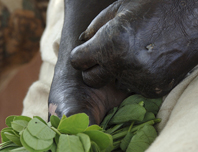 Leprosy, a chronic infectious disease mainly affecting the skin, peripheral nerves, upper respiratory tract and eyes, has impacted people and their societies for thousands of years. Persons with leprosy were ostracized by their communities and families, and looked upon as objects to be feared. But leprosy research has thrived throughout the decades, and the drugs that have subsequently been developed have made leprosy a disease that is curable, and made treatment provided in the early stages successful in averting disability.
Leprosy, a chronic infectious disease mainly affecting the skin, peripheral nerves, upper respiratory tract and eyes, has impacted people and their societies for thousands of years. Persons with leprosy were ostracized by their communities and families, and looked upon as objects to be feared. But leprosy research has thrived throughout the decades, and the drugs that have subsequently been developed have made leprosy a disease that is curable, and made treatment provided in the early stages successful in averting disability.
The disease was first arrested in the 1940s with the development of the drug dapsone. Further research led to the development of a more successful multidrug therapy (MDT). Over the past 20 years, more than 14 million persons with leprosy have been treated, about 4 million of them since 2000. The prevalence rate of the disease has dropped by 90%: from 21.1 per 10,000 persons to less than 1 per 10,000 persons in 2000.
Although leprosy has been eliminated from 119 out of the 122 countries where the disease was considered a public health problem in 1985, persons affected by leprosy continue to face high levels of exclusion in society.
Persons affected by leprosy acquire a disability due to their condition, for instance, facial and other disfiguration as a result of the disease, which further leads to pronounced physical and attitudinal barriers to inclusion in their communities. Historically held fears and assumptions about leprosy continue to promote the pervasive exclusion of persons affected by leprosy from mainstream efforts to include them in society and development.
Exclusion and barriers are often a result of inaction or actions by Governments, healthcare services, educational institutions and their own communities that often lead to social isolation, discrimination and under-representation in the educational, employment and other social domains. Furthermore, persons affected by leprosy are not well represented in the disability rights movement, nationally and globally; a common misconception persists that leprosy is only related to health and is not a disability issue.
The Convention on the Rights of Persons with Disabilities (CRPD) calls upon States Parties to take action to combat such stigma and discrimination, as well as to work to ensure the full and equal participation of all persons with disabilities in society, on an equal basis with others.
Leprosy programmes around the world need to be further improved and must focus on underserved populations and inaccessible areas to improve access and coverage. Persons affected by leprosy who also live with a disability should be empowered in their local communities to raise awareness and help improve the understanding of the disease. Enhancing collaborative efforts between healthcare practitioners and the general public can further help reduce the discrimination and isolation currently experienced by people affected by leprosy within the disability population.
As part of an initiative to include persons affected by Leprosy in the disability movement, Disabled People’s International (DPI) with the support of the Nippon Foundation and DESA will convene an event entitled “Voices of People affected by Leprosy,” during the 8th Session of the Conference of States Parties to the CRPD to be held from 9-10 June 2015.
The Conference of States Parties to the CRPD is the world’s largest and most diverse global disability meeting that brings together high-level Government officials, UN agencies, leading civil society organizations, including organizations of persons with disabilities, academia, practitioners and service providers. The event on leprosy hopes to draw greater attention to issues by sharing the concerns of persons with leprosy with this key audience to better ensure that their voices and needs are included in the global disability and development agenda.
For more information:
WHO fact sheet on leprosy
Disabled Peoples International
United Nations Enable
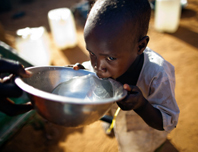 The Humanitarian Affairs Segment of the UN Economic and Social Council (ECOSOC) is a unique platform for Member States, UN agencies, humanitarian and development partners, the private sector and affected communities to discuss emerging and pressing humanitarian issues. This year’s segment will be convened in Geneva on 17-19 June.
The Humanitarian Affairs Segment of the UN Economic and Social Council (ECOSOC) is a unique platform for Member States, UN agencies, humanitarian and development partners, the private sector and affected communities to discuss emerging and pressing humanitarian issues. This year’s segment will be convened in Geneva on 17-19 June.
The ECOSOC Humanitarian Affairs Segment is the only Segment still alternating between holding its sessions in New York and Geneva. This year, it will take place in Geneva and benefit from the extensive presence in the Swiss city of UN agencies, NGOs and the Red Cross/Red Crescent movement. The Segment will be chaired by Ambassador Mohamed Khaled Khiari, Permanent Representative of Tunisia to the United Nations and Vice-President of ECOSOC.
In 2015, the Economic and Social Council will support the transition to the new post-2015 development framework through its theme “Managing the transition from the Millennium Development Goals to the sustainable development goals: What will it take”. The Humanitarian Affairs Segment will contribute to this reflection, while the focus will be maintained on the Segment’s theme over the last two years and leading to the World Humanitarian Summit: “the future of humanitarian affairs: towards greater inclusiveness, coordination, interoperability and effectiveness”.
The Segment will be organized in the form of two high-level panels, a general debate, numerous interesting side-events sponsored by a wide range of actors and a humanitarian fair in the halls of the Palais to showcase effective humanitarian action. The two high-level panel discussions will be on ‘Addressing Capacity and Resource Challenges through Humanitarian Financing’ and on ‘Protecting Civilians by Upholding International Humanitarian Law”.
Around 20 side-events organized by humanitarian partners and Member States and including film screenings and workshops – will provide participants with essential information on a wide range of humanitarian issues, opportunities and challenges. A high-level side-event will take place outside of the Palais des Nations and gather the heads of UN and non-UN agencies as well as the UN Emergency Relief Coordinator, to discuss the ‘Future or Humanitarian Action’ in light of preparations for the World humanitarian Summit in May 2016.
The Segment will be accompanied by a humanitarian fair providing insight to the Segment’s participants into what it feels like to live and/or work in humanitarian settings showcasing the reality of humanitarian settings.
The annual informal ECOSOC event on the transition from relief to development will also take place during the Humanitarian Affairs Segment. The event will focus on how recovery and resilience-building activities in countries which are experiencing humanitarian crises can increase the effectiveness of the overall assistance effort.
For more information:
Humanitarian Affairs Segment of ECOSOC
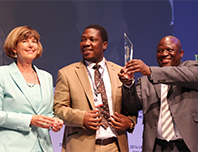 The United Nations Public Service Forum, Day and Awards Ceremony, a capacity-building gathering on public governance, will honor the best initiatives in governance and public service from 23 to 26 June in Medellin, Republic of Colombia. The theme of this year’s Forum is innovating service delivery to implement the post-2015 development agenda and it will culminate in the ceremony for the Winners of the UN Public Service Award from 18 countries.
The United Nations Public Service Forum, Day and Awards Ceremony, a capacity-building gathering on public governance, will honor the best initiatives in governance and public service from 23 to 26 June in Medellin, Republic of Colombia. The theme of this year’s Forum is innovating service delivery to implement the post-2015 development agenda and it will culminate in the ceremony for the Winners of the UN Public Service Award from 18 countries.
The 2015 UN Public Service Awards Winners from Azerbaijan, Ecuador, Estonia, India, Kenya, Mexico, Republic of Korea, Singapore, Spain, Thailand, Turkey, United Arab Emirates (1 st place winners) and Brazil, Ethiopia, France, Indonesia, Latvia, Philippines, Thailand (2nd place winners) will be celebrated during the 2015 UN Public Service Forum, Day and Awards Ceremony.
“The awards competition process helps us uncover and share many innovations that are going on all over the world in public sector institutions – innovations that make the lives of many people better”, UN DESA’s Under-Secretary-General Mr. Wu Hongbo noted during the 2014 United Nations Public Service Forum that was held in Seoul, Republic of Korea.
The 2015 Forum will help build a shared understanding on innovative government policies and strategies, practices and tools for building public sector capacities to promote a more effective, transparent, accountable, participatory and citizen-centric public administration and service delivery in support of the implementation of the post-2015 development agenda.
The Forum will also help build the capacity of governments, particularly in developing and Least Developed Countries, to anticipate and respond in innovative ways to the challenges posed by the implementation of the development goals and countries’ transition from meeting the Millennium Development Goals to implementing the post-2015 development agenda.
The Forum also promotes international and regional cooperation by providing government officials and other stakeholders an opportunity to exchange good practices, experiences and lessons learned through networking. Furthermore, the UN Public Service Awards (UNPSA) brings attention to innovative practices in the public service, which consequently can lead to replication in many countries.
Winning the Award has a big impact on the winning countries, beyond the ceremony. “Huduma Programme is already proving to be a showcase in efficient and effective public service delivery in Africa and beyond”, the President of Kenya Uhuru Kenyatta noted during a recent meeting with the UNPSA 2015 Winner the Huduma Programme that provides access to public services and information through One Stop Shop citizen service centres in Kenya.
Representatives from the Mobile Community Service Centre in the Limpopo Province of South Africa, Winner from 2004, shared that winning the UNPSA has incentivized institutions to “promote more innovative and creative solutions in fighting crime”.
UNPSA 2014 Winner from Brazil, the Mae Coruja Program from Pernambuco, noted that winning the Award has facilitated sharing the results of their work. “The Mae Coruja programme has produced an impact in reducing infant mortality and bringing positive change in the lives of these women…The programme is empowering women, families, and the society as a whole. It has brought us something we believe in”.
An estimated 800 participants from all over the world are expected to attend the Forum this year, including Ministers, senior government officials, and representatives from civil society, academia, and the private sector as well as international and regional organizations. The Forum will be conducted in plenary sessions and parallel capacity development workshops, and other events including an Expert Group Meeting, exhibitions and study visits.
The Forum is organized by UN DESA through its Division for Public Administration and Development Management (DPADM), in collaboration with the United Nations Entity for Gender Equality and the Empowerment of Women (UN Women), and with support from the hosting Government of the Republic of Colombia.
For more information: United Nations Public Service Awards
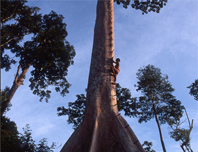 On 15 May, the eleventh session of the UN Forum on Forests successfully concluded with the approval of a wide-ranging omnibus resolution that extends the International Arrangement on Forests (IAF) until 2030. Demonstrating a high level of political interest in forests, delegates from over 125 Member States participated, including 30 forest Ministers and Vice Ministers.
On 15 May, the eleventh session of the UN Forum on Forests successfully concluded with the approval of a wide-ranging omnibus resolution that extends the International Arrangement on Forests (IAF) until 2030. Demonstrating a high level of political interest in forests, delegates from over 125 Member States participated, including 30 forest Ministers and Vice Ministers.
Expectations were high for this UNFF session, and senior UN officials characterized the need to balance ambitious vision with practical structure as a “formidable task”. In the opening session of the Forum on 4 May, UN Deputy Secretary-General Jan Eliasson highlighted the importance of forests for global development, stating “A meaningful decision on strengthening the International Arrangement on Forests will put us on a path towards a greener economy and a more equitable and sustainable future for all.”
In addition to extending the timeline for the International Arrangement for another 15 years, UNFF11 also agreed to update the UN Forest Instrument, strengthen the Forum and its Secretariat, develop a strategic plan, and establish a strengthened UNFF Global Forest Financing Facilitation Network (building on the UNFF Facilitative Process) to mobilize and enhance access to financial resources for forests.
A renewed focus on implementation and forest financing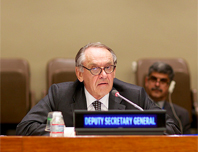
Director of the Forum Secretariat, Manoel Sobral Filho noted that through the agreement on the UNFF Global Financing Facilitation Network, re-structured UNFF sessions, delegates at UNFF11 had paved the way for a more effective International Arrangement. Starting in 2017, the Forum will meet annually for one-week sessions with an increased focus on implementation and technical advice.
The UNFF11 Resolution also calls for systematic collaboration with the multilateral financial institutions like the Global Environment Facility (GEF) to support countries in the implementation of sustainable forest management. In particular, the Forum requested the GEF to consider establishing a new focal area on sustainable forest management during its next replenishment period.
Forest-related aspects of the post-2015 development agenda
“To build a sustainable, climate-resilient future for all, we must invest in our world’s forests. That will take political commitment at the highest levels, smart policies, effective law enforcement, innovative partnerships and funding”
Ban Ki-moon UN Secretary-General
UNFF11 outcomes also paved the way for the Forum to play a more active role in contributing to the High-level Political Forum, and to the follow-up and review of the forest-related aspects of the post-2015 development agenda, including its forest-related SDGs and targets.
Delegates also agreed to integrate the forest-related SDGs and targets into the UN Forest Instrument, while at the same time extending the timeline of the Global Objectives on Forests (GOFs) from 2015 to 2030 (in line with the timeline of the post-2015 development agenda).
2015, a time for global action for forests
UNFF11 also adopted a Ministerial Declaration that highlights sustainable management of all types of forests is vital to facilitate transformative change and address challenges – from poverty eradication, energy and economic growth to food security, biodiversity conservation and climate change mitigation and adaptation.
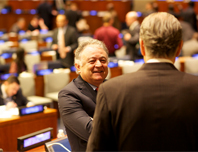 Ministers responsible for forests, pledged to cooperate internationally and bilaterally to address the drivers of deforestation and degradation, including by promoting secure land tenure rights and stakeholders’ participation. They recognized that the UNFF, with its universal membership and comprehensive mandate plays a vital role in addressing challenges related to forests in a holistic and integrated manner.
Ministers responsible for forests, pledged to cooperate internationally and bilaterally to address the drivers of deforestation and degradation, including by promoting secure land tenure rights and stakeholders’ participation. They recognized that the UNFF, with its universal membership and comprehensive mandate plays a vital role in addressing challenges related to forests in a holistic and integrated manner.
The Declaration emphasized the need to integrate forests in the outcomes of key international conferences taking place in 2015, including the Addis Ababa Conference on Financing for Development, the UN Summit for the adoption of the post-2015 development agenda and its SDGs, and the Paris Climate Change Conference.
The twelfth session of the UNFF is expected to be held in mid-2017. During the intersessional period of 2016 to early 2017, a strategic plan for 2017 -2030 will be developed through meetings of UNFF ad hoc expert groups (2016) and a UNFF working group (late 2016 /early 2017).
For more information: 11th session of the United Nations Forum on Forests
 Leprosy, a chronic infectious disease mainly affecting the skin, peripheral nerves, upper respiratory tract and eyes, has impacted people and their societies for thousands of years. Persons with leprosy were ostracized by their communities and families, and looked upon as objects to be feared. But leprosy research has thrived throughout the decades, and the drugs that have subsequently been developed have made leprosy a disease that is curable, and made treatment provided in the early stages successful in averting disability.
Leprosy, a chronic infectious disease mainly affecting the skin, peripheral nerves, upper respiratory tract and eyes, has impacted people and their societies for thousands of years. Persons with leprosy were ostracized by their communities and families, and looked upon as objects to be feared. But leprosy research has thrived throughout the decades, and the drugs that have subsequently been developed have made leprosy a disease that is curable, and made treatment provided in the early stages successful in averting disability. 
 The Humanitarian Affairs Segment of the UN Economic and Social Council (ECOSOC) is a unique platform for Member States, UN agencies, humanitarian and development partners, the private sector and affected communities to discuss emerging and pressing humanitarian issues. This year’s segment will be convened in Geneva on 17-19 June.
The Humanitarian Affairs Segment of the UN Economic and Social Council (ECOSOC) is a unique platform for Member States, UN agencies, humanitarian and development partners, the private sector and affected communities to discuss emerging and pressing humanitarian issues. This year’s segment will be convened in Geneva on 17-19 June. The United Nations Public Service Forum, Day and Awards Ceremony, a capacity-building gathering on public governance, will honor the best initiatives in governance and public service from 23 to 26 June in Medellin, Republic of Colombia. The theme of this year’s Forum is innovating service delivery to implement the post-2015 development agenda and it will culminate in the ceremony for the Winners of the UN Public Service Award from 18 countries.
The United Nations Public Service Forum, Day and Awards Ceremony, a capacity-building gathering on public governance, will honor the best initiatives in governance and public service from 23 to 26 June in Medellin, Republic of Colombia. The theme of this year’s Forum is innovating service delivery to implement the post-2015 development agenda and it will culminate in the ceremony for the Winners of the UN Public Service Award from 18 countries. On 15 May, the eleventh session of the UN Forum on Forests successfully concluded with the approval of a wide-ranging omnibus resolution that extends the International Arrangement on Forests (IAF) until 2030. Demonstrating a high level of political interest in forests, delegates from over 125 Member States participated, including 30 forest Ministers and Vice Ministers.
On 15 May, the eleventh session of the UN Forum on Forests successfully concluded with the approval of a wide-ranging omnibus resolution that extends the International Arrangement on Forests (IAF) until 2030. Demonstrating a high level of political interest in forests, delegates from over 125 Member States participated, including 30 forest Ministers and Vice Ministers.
 Ministers responsible for forests, pledged to cooperate internationally and bilaterally to address the drivers of deforestation and degradation, including by promoting secure land tenure rights and stakeholders’ participation. They recognized that the UNFF, with its universal membership and comprehensive mandate plays a vital role in addressing challenges related to forests in a holistic and integrated manner.
Ministers responsible for forests, pledged to cooperate internationally and bilaterally to address the drivers of deforestation and degradation, including by promoting secure land tenure rights and stakeholders’ participation. They recognized that the UNFF, with its universal membership and comprehensive mandate plays a vital role in addressing challenges related to forests in a holistic and integrated manner.